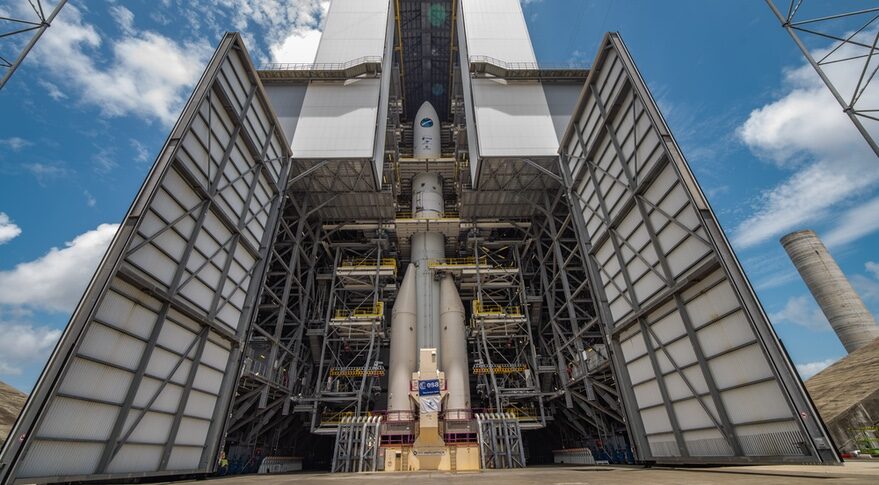WASHINGTON — The European Space Agency has again delayed the first flight of Europe’s Ariane 6 launch vehicle, this time to late 2023, as the new vehicle makes slow progress to the launch pad.
At an Oct. 19 briefing, ESA officials as well as those with the rocket’s prime contractor, ArianeGroup, and launch services provider Arianespace said the first flight of the rocket from Kourou, French Guiana, was now scheduled for the fourth quarter of 2023, a slip from a notional launch date in early 2023.
ESA Director General Josef Aschbacher said that date emerged from an external review of the program established in May. He warned that date was not final. “With a project of this magnitude, it needs to be clear that this is a planned date and that the program will still need to successfully and timely achieve a number of key milestones in order for this schedule to be valid,” he said.
Aschbacher and others did not state what specific issues caused the latest slip for a vehicle once projected to make its inaugural launch in 2020. Instead, they emphasized several ongoing critical tests, in particular static-fire tests of the upper stage that started earlier this month and integrated testing of an Ariane 6 prototype with the launch facilities in Kourou built for it. Another milestone is a launch system qualification review.
André-Hubert Roussel, chief executive of ArianeGroup, said the initial upper stage hot-fire test was “extremely successful,” with review of the data from that 45-second test ongoing. “There remains quite a number of tests to perform,” he said, including three hot-fire tests, before the upper stage is qualified for flight.
An Ariane 6 prototype is on the pad at Kourou for tests of interfaces between the rocket and ground equipment. “We still have quite some intensive tests to do,” said Philippe Baptiste, head of the French space agency CNES. Those range from tests of software and control systems to tests of mechanical and fluid interfaces.
The goal is to complete both the upper stage and launch complex tests in the first quarter of 2023. After that, Roussel said, there will be views of the data of those tests and qualify the vehicle for flight. The first flight model of the Ariane 6 is in the “final steps” of being assembled, he said, and then be shipped to Kourou for the launch campaign. The Ariane 6 is designed for a relatively short launch campaign of two to three weeks, but he suggested that it may be longer for the first flight.
“For the qualification flight, obviously we have taken some margin” in the schedule, he said, which he said was on the order of a few months.
ESA and ArianeGroup officials did not discuss details on the cost of this latest delay. Daniel Neuenschwander, ESA director of space transportation, said that the overall cost of Ariane 6 development to this point was “slightly below” four billion euros ($3.9 billion), but did not state how much more it would cost to complete work on the rocket.
At the November ESA ministerial meeting, Neuenschwander said ESA would seek 600 million euros for a “transition program” for the Ariane 6 to support an increase in production of the rocket as it enters commercial service. ESA member states, he said, have already committed two-thirds of the funding for that program.
ESA will also seek support for a “Block 2” upgrade for the Ariane 6 that will include a larger solid rocket motor, the P120+, for the vehicle’s strap-on boosters as well as improvements in the Vinci engine in the upper stage. That will increase the rocket’s capacity to low Earth orbit by three metric tons, he said.
Despite the delays, Roussel said he was pleased with the recent testing milestones. “I am optimistic on the progress,” he said, adding that the company would not cut corners to save a few weeks of schedule.
Stéphane Israël, chief executive of Arianespace, said demand for Ariane 6 remains high, citing Amazon’s large order of Ariane 6 launches it made in April for its Project Kuiper broadband constellation, along with orders of Blue Origin’s New Glenn and United Launch Alliance’s Vulcan Centaur. “It’s a very strong order book regarding Ariane 6 for a launcher that has not flown yet.”

